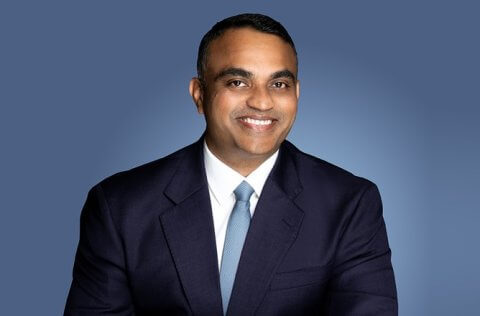CNME Editor Mark Forker sat down for an exclusive interview with Jacob Chacko, Regional Director, Middle East and Africa at HPE Aruba Networking, in an effort to better understand how their acquisition of Juniper Networks for $14bn can help them unlock new opportunities in the burgeoning datacentre space across the UAE, how it can also help them become a global force in service provider networking – and what role he envisages AI playing in transforming the future of networking.

One of the many benefits of my job as Editor of CNME, is the opportunity to speak to some of the most prominent technology leaders from across the Middle East, APAC, Europe and United States.
Unsurprisingly, they share many of the same traits that are required to be a successful business leader in the ultra-competitive world of IT.
Resilience. Leadership. Dedication. Commitment. Vision. Passion.
All those characteristics could be used to describe Jacob Chacko.
However, unlike some of his contemporaries, Chacko has the uncanny ability to perfectly articulate the key messaging that HPE really wants to convey to the public.
He peels back the layers of a story to reveal what it all means in the grand scheme of things, and that is a rare skill in the cut and thrust world of technology.
It is one of the many reason that I always relish the opportunity to get to speak to Chacko, because I always feel informed after our conversations, and the excitement and passion he has for HPE Networking really is palpable.
HPE’s acquisition of Juniper Networks for $14bn officially closed in July of this year, after being formally announced in January 2024. It is a game-changing deal for the industry with the promise of increased innovation for customers and partners.
Yes, the deal to buy Juniper will copper-fasten HPE’s position in networking, but as Chacko explains, it will allow them to meet growing customer demands in areas like enterprise campus, datacentres and service provider networking.
“The acquisition of Juniper Networks significantly broadens our ability to address customer needs across the entire networking spectrum. HPE has long been a leader in secure, AI-powered enterprise campus and branch networking, while Juniper brings deep expertise in datacentre and service provider networking. Together, we can deliver a unified portfolio that spans from edge to cloud, helping customers to modernise their networks, improve automation and assurance through AI, and scale securely to meet the rising demands of digital transformation,” said Chacko.
It is very common that when mega acquisition deals are brokered, quite naturally, it can take quite a while to absorb the new entity into the existing business structure, and often customers can be impacted.
HPE is renowned for its customer-centric approach, and Chacko doubled down that one of the primary factors in the acquisition is to provide them with the ability to provide an even better customer experience.
“Our customers are increasingly looking for simplicity, automation, and security in their networking environments, whether in the campus, datacentre, or across service provider networks. By combining HPE’s strength in the enterprise edge with Juniper’s leadership in AI-driven datacentre and carrier-grade networking, we can now provide a complete, end-to-end offering. This means customers in the MEA region can accelerate their cloud adoption, gain deeper visibility into network performance, and future-proof their infrastructure with technologies designed to scale,” said Chacko.
Chacko highlighted that across the Middle East, and especially in countries like the UAE, KSA and Qatar, the sheer scale of investment in digital transformation is unprecedented on a global scale but stressed that the network is key foundation in any digital strategy.
“For customers across the Middle East and Africa, the network is the backbone of their digital strategies — from powering smart campuses to enabling hyperscale datacentres and next-generation service provider networks. The integration of Juniper’s innovation into the new HPE Networking portfolio gives us a much stronger proposition. We can now address every segment of the market with AI-driven solutions, advanced security, and cloud-native capabilities. This allows us to better support enterprises and service providers in the region as they expand, innovate, and compete on a global scale,” said Chacko.
Datacentres are being viewed as the key foundation in the AI infrastructure that is needed to drive the digital future.
However, what I wanted to know was how can HPE leverage the acquisition of Juniper to open and unlock new opportunities in the burgeoning datacentre space.
He reiterated that by embedding Juniper’s strength in high-performance gave HPE Networking a great springboard to capitalise on the opportunities emerging in AI-datacentres.
“AI is redefining the datacentre, and the acquisition of Juniper positions HPE to lead in this transformation. By combining HPE’s compute and storage leadership with Juniper’s strengths in high-performance, AI-driven networking, we can deliver datacentre solutions that are built for the scale, automation, and agility required to power the next wave of AI workloads. This creates unprecedented opportunities for our customers to modernise their infrastructure and unlock new levels of performance and efficiency.”
Chacko outlined that another key differentiator for HPE was the trust that it can deliver to both current and prospective partners looking to build AI-infrastructure.
“The datacentre has become the epicentre of AI innovation, and customers are looking for trusted partners who can help them design, build, and operate AI-ready infrastructure. With Juniper, HPE is now uniquely positioned to provide end-to-end datacentre solutions — from servers and storage to intelligent, automated networking. This not only accelerates time-to-value for customers but also allows us to serve the fast-growing AI and cloud markets across the Middle East and Africa with even greater impact,” said Chacko.
Chacko also added that he believed the acquisition of Juniper allowed them to be more ‘strategic’ when dealing with governments and service providers.
“In the MEA region, we’re seeing unprecedented investment in AI-ready datacentres — from hyper-scalers to national digital transformation programs. The integration of Juniper’s advanced datacentre networking into HPE’s portfolio opens new opportunities for us to support this growth with highly scalable, AI-driven infrastructure solutions. It allows us to partner more strategically with enterprises, governments, and service providers to build the digital foundations that will fuel innovation, economic diversification, and competitiveness in the years ahead,” said Chacko.
There have been many analysts that believe that the Juniper acquisition will also strengthen HPE’s hand when it comes to service provider networking, given Juniper’s rich legacy with the telecommunications industry.
Chacko highlighted the intense pressure that service providers are being saddled with when it comes to delivering high-performance and lower latency, but again, he believes that Juniper’s storied and fabled history in service provider networking gives HPE the ability to tackle this issue head-on for service providers.
“Juniper has a deep heritage in service provider networking, with decades of innovation in carrier-grade routing, automation, and security. By bringing this into HPE, we significantly strengthen our capabilities in serving the world’s leading telecom and service providers. This synergy allows us to offer a comprehensive, AI-native portfolio — spanning the campus, datacentre, and carrier networks — positioning HPE as a true global force in end-to-end networking. Service providers are under immense pressure to deliver higher performance, lower latency, and greater automation, all while managing costs. Juniper’s legacy in telecommunications, combined with HPE’s leadership in hybrid cloud and edge-to-cloud architectures, means we can now deliver the agility, scalability, and intelligence that service providers demand. This empowers them to accelerate 5G, AI, and cloud services, and ultimately deliver more value to their customers,” said Chacko.
Chacko also added that the evolving and heightened expectations of a young population was also placing service providers under strain but emphasised how their edge-to-cloud strategy gave service providers more choice.
“In the Middle East and Africa, service providers are investing heavily in 5G and digital infrastructure to meet the demands of a rapidly growing, young, and connected population. By integrating Juniper’s carrier-grade expertise with HPE’s edge-to-cloud strategy, we can better support regional operators as they expand their networks, modernize services, and unlock new revenue streams. This makes HPE a stronger and more relevant partner for the telco industry, both globally and here in MEA,” said Chacko.
The rise of Generative AI and Agentic AI are completely reshaping and reimaging every major industry vertical on a global scale.
However, AI also has the power to transform networking, and Chacko laid out what HPE’s approach to AI-enabled networking solutions and their vision for AI’s role in networking infrastructure.
He reinforced the commitment HPE has made to making networking truly AI-native.
“AI is not only transforming industries but also the very networks that power them. At HPE, our vision is to make networking truly AI-native — self-learning, self-optimising, and predictive. Through the combination of HPE’s secure edge-to-cloud networking and Juniper’s AI-driven automation and assurance, we are building infrastructure that can anticipate issues before they occur, adapt in real time, and deliver a consistently seamless digital experience. We see AI as the nervous system of tomorrow’s networks, enabling agility, resilience, and intelligence at every layer,” said Chacko.
Chacko again touched on the importance of customer-centricity and declared that HPE wants to equip their customers with smarter networks, that significantly reduces overheads and complexity.
“Our customers don’t just want faster networks they want smarter networks that can scale with AI-driven business models. HPE’s approach is to embed AI into every part of the networking lifecycle — from simplifying deployment and automating operations to proactively identifying and resolving performance bottlenecks. This reduces complexity, lowers costs, and delivers higher reliability. With AI, networking becomes a true enabler of innovation rather than a constraint. In the Middle East and Africa, organizations are embracing AI to drive national transformation strategies, smart cities, and digital economies. Networking is the foundation of this shift. Our AI-enabled networking solutions are designed to provide the intelligence, automation, and security needed to support these ambitious initiatives. By combining global innovation with local execution, we can help customers in the region harness the full potential of AI to transform both their networks and their industries,” said Chacko.
Chacko believes that some of the key messaging around this historic deal with Juniper Networks has been lost and caught in all the noise that typically happens with an acquisition of this magnitude.
When pressed on what was the primary message, he wanted our readers to take from the merger, he said that their AI-native portfolio is ‘unmatched’ in the market.
“The message is simple: with the acquisition of Juniper, HPE is making a bold statement that we are committed to being a global leader in networking. By bringing together HPE Aruba Networking strengths at the enterprise edge with Juniper’s expertise in datacentre and service provider networking, we now offer an unmatched, AI-native portfolio that spans the entire spectrum — from edge to cloud to core. This positions us, and our customers, for the next decade of digital innovation. What this acquisition means for customers is choice, simplicity, and innovation. They will benefit from a unified approach that delivers AI-driven automation, secure connectivity, and cloud-native agility across every part of their network. Our future direction is about empowering customers to accelerate their digital strategies with confidence, knowing they have a partner that can scale with them at every stage,” said Chacko.
He concluded and brought the curtain down on another wonderfully engaging, entertaining and informative interview, by reinforcing the viewpoint that the acquisition was ‘unlocking opportunity’.
For us in the Middle East and Africa, the clear message is that HPE is doubling down on helping this region build the digital foundations of the future to drive growth, competitiveness, and innovation. With Juniper Networks, we are now in a stronger position than ever to support enterprises, governments, and service providers with secure end-to-end networking solutions that are purpose-built with AI and for AI. This acquisition is about unlocking opportunity — globally and here in MEA,” said Chacko.





